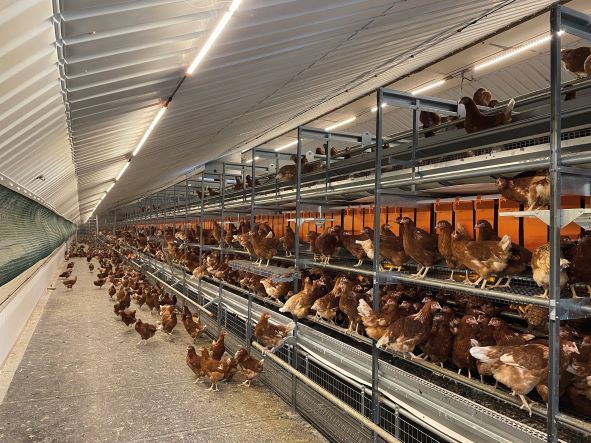Investment in barn production could be the answer to maintaining a viable egg business, according to Newquip
This article was first published in the September Buildings Supplement to Poultry Business
Like many sectors, the egg industry has been hit very hard by increasing raw material prices, with feed, labour and energy costs all going up. Due to the rapid expansion in free-range over recent years, an over-supply of egg within the UK market has slowed the rate at which these increases can be passed on to the consumers, which ultimately needs to happen as primary produces and packers struggle for profit margins and viability.
A recent report by Andersons states barn production is expected to grow from its current 3% to 10% of the market by 2025. This is due to the decision to remove enriched colony egg from supermarket shelves, a pledge made prior to all of the recent world events which are affecting the present situation. This decision will hopefully now be one which will allow the industry to return to a sustainable position, where supply and demand are more in balance.
The number of producers who have enriched colonies has declined in recent years and some are opting to convert to barn egg. The conversions, crucially, are resulting in lower bird numbers due to both the lower stocking densities and to comply with integrated pollution prevention and control (IPPC) directive emissions permits, as barn birds have higher emission factors than colony birds. Often the result is around 50% of the
original bird numbers permitted on a site, so a 7% increase in barn production could result in a similar drop in the national flock size.
As we head into the predicted recession, this is an important change, says Adam Dye, managing director at Newquip. Colony eggs will still have a place within the UK, especially given the economic outlook. That said, the increase in recognition of barn production provides another tier within the market from which consumers can select.
“It is all about providing consumer choice,” says Dye. “The UK industry has continually evolved to ensure welfare standards are some of the highest in the world, and consistently reinvests to make sure we remain at the forefront in this regard.”
The requirement for an economical egg on the supermarket shelves will definitely mean the production ratios of colony, barn, free-range and organic will need to change, Dye says. It is most likely that investment in barn will come from existing sites, either the conversion of colony units or to allow the resting of ranges within the free-range sector.
“Neither of these solutions increases the national flock, and while we are trying to increase the longevity of birds, hopefully the overall reduction of bird numbers will allow for a natural supply and demand correction without causing further suffering within the industry.”
Some of the main benefits of barn over free-range include being able to control the environment via automation without as many external influences. The temperature, lighting and ventilation can be monitored to create the
optimum environment for the birds, so they will be less likely to feel stressed or overfeed. Reducing stress also means pecking is managed, resulting in better feather cover and fewer losses. The current systems are able to automate everything from the feeding times of the stock, to ensuring the eggs arrive at the packing centre directly. While free-range develops and uses much of the same technology, the raw material cost rises we have seen recently will increase the difference in the cost of production.
Newquip’s Natura systems from Big Dutchman have been designed with both animal welfare and the environment in mind, Dye explains. Multiple levels allow all floor space to be used for litter, with distinct zones for feeding and drinking, laying, resting, and scratching, enabling the birds to move freely around the barn. The influence of external factors, such as adverse weather, disease and predators, can be controlled, as well as ensuring current regulations are met.
Dye says: “The reduction in the number of birds in the housing space means a smaller amount of supply, but the demand is unaffected. With the surplus of eggs in the industry, lowering bird numbers helps to reduce this excess.
“Direct online also removes the need to pack and transport the eggs to a packing centre because it all can be done on site, with a couple of operators overseeing the process. Farming is not so labour-intensive if you can involve technology in this way.”


